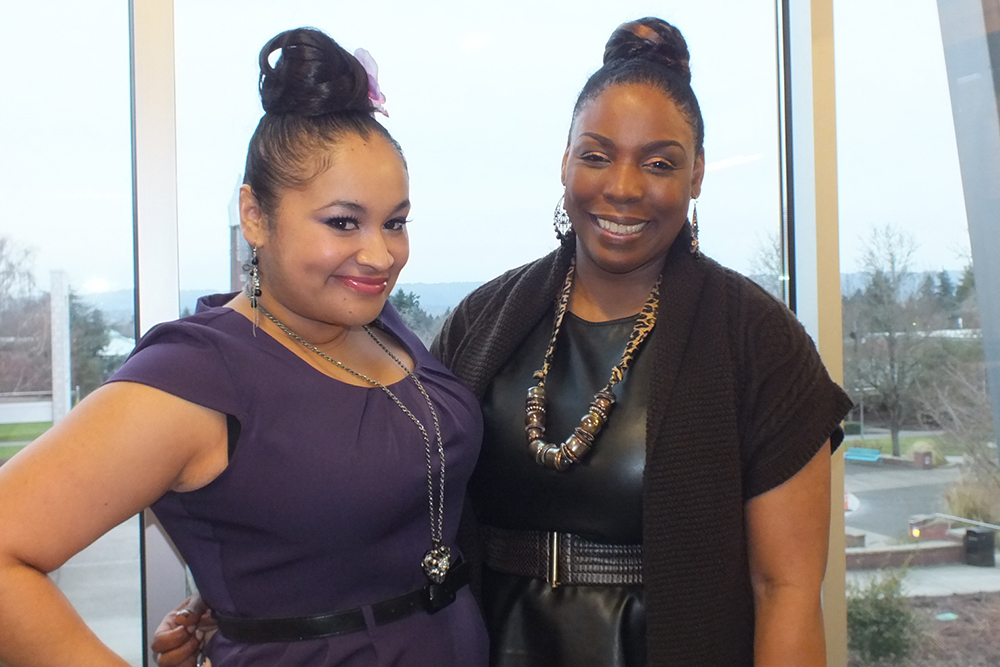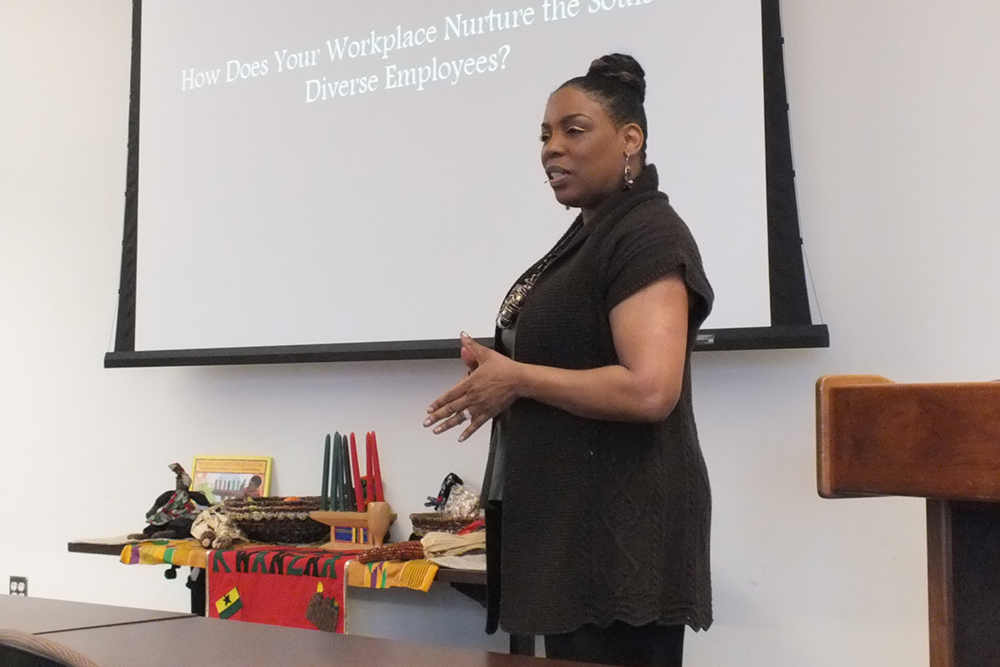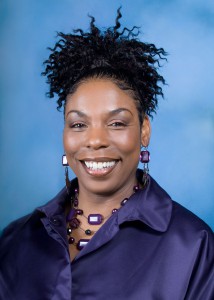Why Mentors Matter

Clark paralegal student Letisia Ford, left, introduced Professor Debi Jenkins at the 2014 winter quarter Faculty Speaker Series presentation.
Most large workplaces today have made some efforts toward encouraging diversity: a training session here, an “awareness day” there. But, as Early Childhood Education and Psychology professor Debi Jenkins argued passionately in her winter quarter Faculty Speaker Series presentation, truly fostering diversity requires a daily commitment by all members of the workforce, not just a once-a-year activity attended by a few.
“The question to ask is: How does the workplace nurture the souls of its diverse employees?” Jenkins said during her lecture, which was held February 13 in the Ellis Dunn Community Room on Clark College’s main campus. More than 40 people were in attendance, including college administration, faculty, staff, and students, as well as members of the larger community.
Appropriately enough, given Jenkins’s topic, she was introduced by a student who came to Jenkins for mentorship at a moment of crisis. Clark College paralegal student Letisia Ford said she first met Jenkins when Ford was referred to her by another professor after experiencing prejudice from her classmates. “I was called certain names, I’ve been singled out and called ‘ghetto,’ and I’ve been told I need to learn how to ‘speak like an American,'” said Ford, who is fluent in both English and Spanish.
Ford said Jenkins was able to offer her empathy, advice–and courage. “She challenged me to not give up,” said Ford. “She gave me the tools to be able to be positive.”

Prof. Jenkins brought in items from her own family’s Kwanzaa altar to help illustrate her presentation.
It was a fit introduction for Jenkins’s own presentation. Titled “Habari gani?: Support for a diverse workforce through communities of practice,” it synthesized research Jenkins is conducting on diverse employees’ experiences in the workplace. Habari gani is Swahili for ‘What’s happening?,’ a question posed by village elders to younger community members as a way to gauge how they were feeling. “They had the responsibility for the soul of the community,” Jenkins said of these elders, who were called the habari gani menta (“people who ask what’s happening”) but today would probably be called mentors.
Habari gani is also the call that begins each day of the African-American holiday Kwanzaa, and Jenkins used the Seven Principles of Kwanzaa to organize her findings and recommendations. She presented both research on academic literature about challenges experienced by diverse employees as well as direct quotes from anonymous employees of diverse population groups whom she’d interviewed. The results were sobering: employees who felt their employers were constantly watching them, waiting for them to fail–or, as one interviewee put it, to “steal staples.” Others complained of feeling like their abilities and contributions were minimized by their supervisors, or of feeling completely isolated at their workplace.
The remedy, Jenkins said, was to use the habari gani menta mindset at work, reaching out to diverse employees to ensure they felt both understood and valued. As Jenkins explained, this approach makes everyone responsible for creating a workplace that welcomes diversity–but also lets those diverse employees have an active role in how that happens.
Jenkins cautioned members of dominant groups against the urge to try to position themselves as the “expert” when talking with diverse employees. “‘Oh, my cousin dates a black person,'” she said by way of example. “‘Oh, my cousin dates a lesbian.’ That’s great. [But] we members of diverse groups don’t know what our response is supposed to be to that.”
Better to accept the position of listener, Jenkins counseled, and to ask questions about those diverse employees’ own experiences and viewpoints–and really listen to the answers provided.
Jenkins also urged her listeners to ask themselves questions about what their own individual role was in fostering diversity in their workplace, and what they were doing currently to help foster diversity. “If you have to think about, ‘Hmm, what do I do?’ then you’re probably not doing enough,” she said.
Jenkins, who serves as division chair of Behavioral Sciences and head of the Early Childhood Education Department at Clark College, was presenting research that was part of her doctoral thesis in Higher Education Administration, which she plans to complete next year at Phoenix University in Arizona. Jenkins already holds a Master of Science degree in Psychology from that institution, as well as an Associate in Applied Science degree in Early Childhood Education from Clark College and both bachelor’s and master’s degrees in Human Development from Pacific Oaks College in Pasadena, California. In addition, she is founder of Share the Flame, an organization that offers strategies for personal growth and change through one-on-one coaching, workshops and presentations. In 2009, she received the YWCA Woman of Achievement Award for Clark County.
Established by Clark College with support from the Clark College Foundation, the Clark College Faculty Speaker Series honors individual faculty members and celebrates academic excellence. The series showcases recent experiences that have enriched both the life and teaching of a Clark faculty member. Faculty members share their developmental experiences with the college community–and with members of the community at large–while addressing some of today’s most intriguing issues. Visit Clark’s website for more information about both past and upcoming Faculty Speaker Series presentations.
Photos: Clark College/Hannah Erickson
